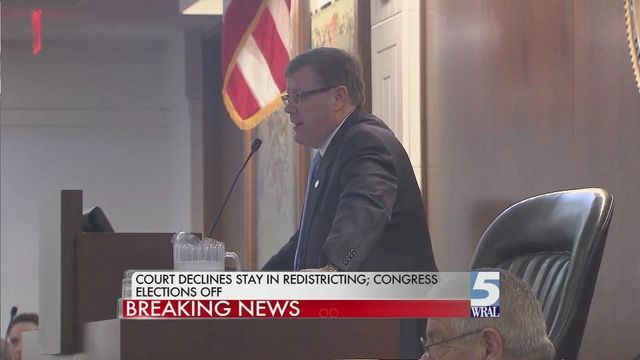North Carolina's U.S. House elections will be delayed as Supreme Court denies stay
The U.S. Supreme Court denied North Carolina's request to put a lower court ruling on hold. That means the state will likely rely on contingency plans for a June 7 congressional election drawn up by lawmakers this week.
Posted — UpdatedThe state's elections were thrown into doubt two weeks ago when a three-judge panel found that lawmakers had unconstitutionally relied too heavily on race in drawing the lines that divide North Carolina into 13 congressional districts. That panel ordered state lawmakers to put new maps into place by Friday.
While the General Assembly met that deadline, top leaders held out hope that Chief Justice John Roberts and his colleagues would make those efforts unneeded. Instead, in a one sentence order, the nation's highest court provided some certainty for how this year's U.S. House elections would be conducted, but raised bigger questions involving other cases headed for the court.
"The application for stay presented to The Chief Justice and by him referred to the Court is denied," read the court's order.
As it is, lawmakers have passed a bill calling for all races on the state's March 15 primary to go forward with the exception of the U.S. House races.
Those races will be contested in a primary slated for June 7 presuming two things happen. Gov. Pat McCrory must sign legislation lawmakers sent him Friday night, and the the three-judge panel that rejected the 2011 maps must sign off on the General Assembly's 2016 effort.
Although only U.S. House races will be delayed, contests up and down the ballot will be affected by new election rules.
In order to deal with the time crunch that two different primaries create, lawmakers also voted to do away with runoffs this year. In most other years, a candidate must received at least 40 percent of the primary vote to avoid a second primary. This year, the top vote-getter in a primary, even if he or she is below 40 percent, will win. That could affect races such as the four-way primary for U.S. Senate, as well as a handful of other statewide and legislative races.
"I am pleased the Court declined to allow the GOP's racially gerrymandered congressional districts to move forward," Rep. Grier Martin, D-Wake, said. "The implications for the equally abusive legislative districts are clear."
There is a separate federal case pending that will be heard in April that challenges state House and Senate districts using virtually the same argument as in the congressional redistricting case. Observers say it could follow a similar path to the case that triggered this week's action.
"You have to think that Chief Justice Roberts spent a lot of time talking to other justices before they made this decision," said Jane Pinsky, executive director of the North Carolina Coalition for Lobbying and Government Reform.
The court's order specifically notes that it was "referred to the Court." Although the federal judiciary is often inscrutable, the refusal to issue a stay is often a sign the justices don't believe those appealing – in this case, the state – can win their case.
Top legislative leaders did not immediately respond to requests for comment late Friday. However, on the floor of the House and the Senate, they defended both their prior efforts as well as a new map.
That new map keeps 87 of North Carolina's 100 counties whole rather than dividing them among two or more congressional districts. It also packs fewer black voters into the 1st and 12th districts, both of which were the focus of the lower federal court ruling.
On balance, the map is more competitive than the one drawn in 2011, but it still gives Republicans an advantage in 10 of the 13 districts. Democrats decried this as unfair, but Republicans said they have every right to use their legislative majorities to their advantage.
"When you hear all these comments and all these complaints about gerrymandering, well, we sat at the master's feet for decades," said Rep. Bert Jones, R-Rockingham, one of the leaders who helped to draft the new maps. "Perhaps some people learned something."
Reform groups have called for lawmakers to turn over the job of drawing maps to a nonpartisan commission. Pinsky said that, after this week's hurried redraw and subsequent court decision, that option should be more appealing than ever.
"For many years, Democrats drew congressional boundaries in North Carolina that produced chaotic court fights," she said. "Now, it's Republican versions that cannot survive."
Related Topics
• Credits
Copyright 2024 by Capitol Broadcasting Company. All rights reserved. This material may not be published, broadcast, rewritten or redistributed.






